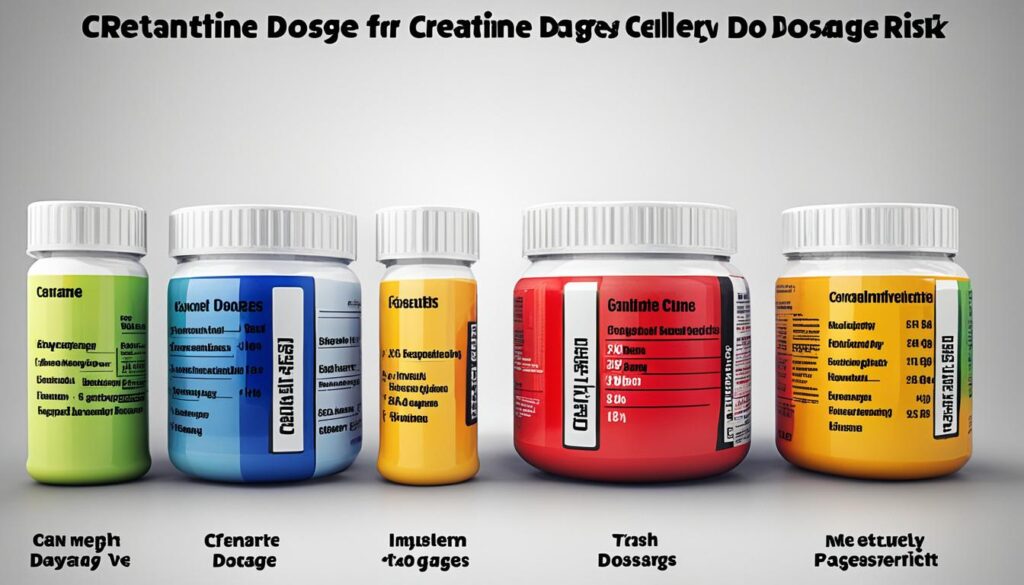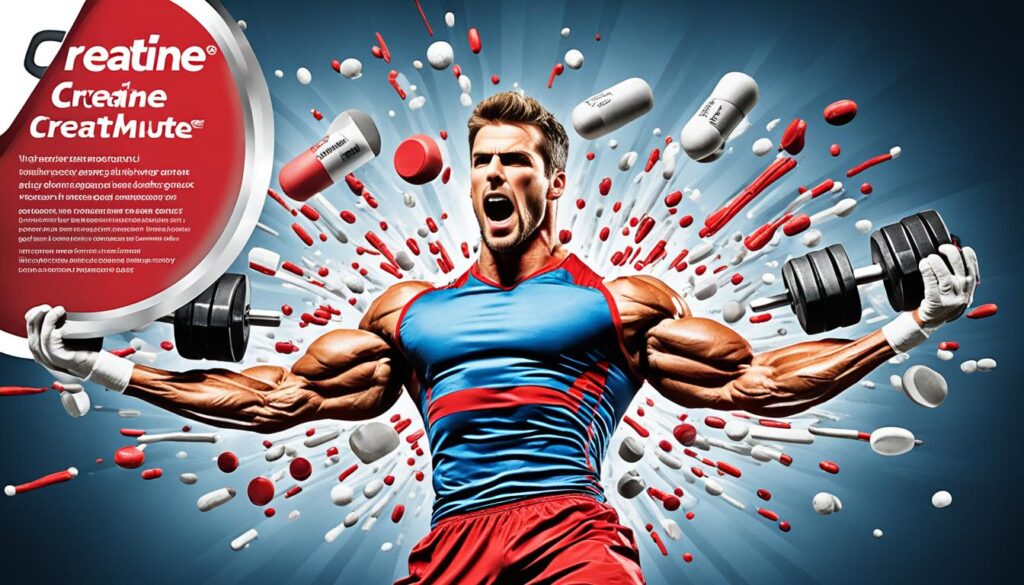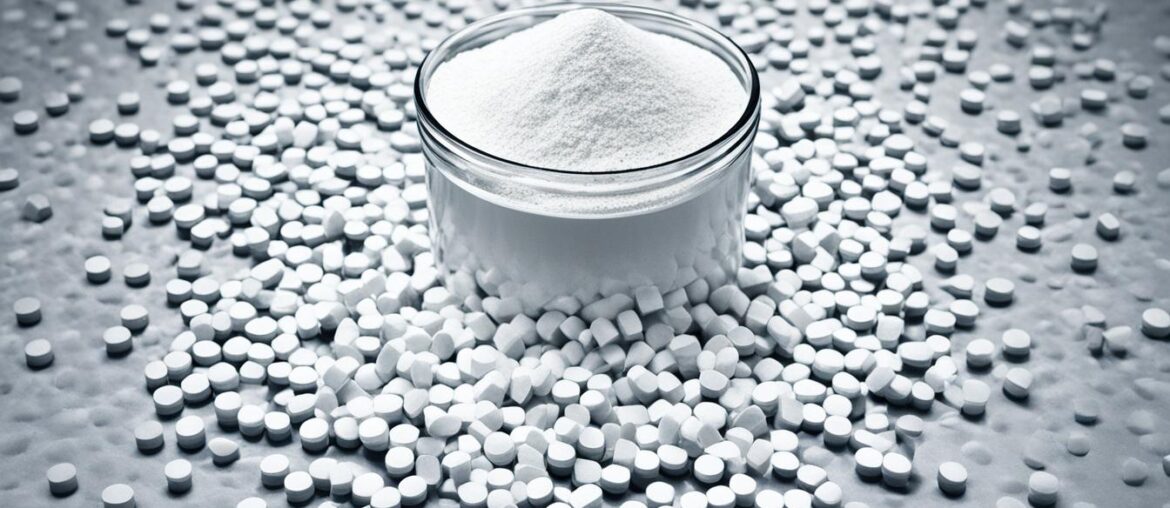Imagine a single supplement that can enhance an athlete’s performance so profoundly that it remains a central focus for sports professionals and researchers alike for decades. This is the reality of creatine, a compound that has not only managed to hold the spotlight but has amplified its significance as years pass. With rigorous investigations underway, a startling and rather reassuring statistic emerges: long-term creatine use has been shown to have no adverse health impacts on athletes even after continuous use for periods extending up to 21 months. This eye-opening data has sparked my intrigue about the long-term effects of creatine and its unrelenting capacity to boost sports performance.
My pursuit for information and clarity brings me to the pivotal analyses, where established studies such as those by Arciero et al. and Becque et al. have extensively documented creatine’s role in enhancing sports performance. The promise of increased anaerobic power, muscle strength, and optimized body composition strikes a chord with the aspirations of athletes and fitness aficionados worldwide. The rigorous creatine research that supports safe and continuous sports performance enhancement illustrates that we are witnessing more than just a trend. It’s a movement towards understanding and harnessing human potential in its purest form.
Key Takeaways
- Scientific studies support the safety of long-term creatine supplementation for up to 21 months.
- Creatine is proven to significantly enhance anaerobic power, muscle strength, and body composition.
- No clinical evidence suggests adverse effects on athletes’ serum, blood, or urinary health markers.
- Empirical research discounts the previously suggested risks to renal and hepatic function.
- Informed and appropriate creatine use is vital for sustaining its positive impact on sports performance.
- Continued exploration in creatine research solidifies its standing as a valuable ergogenic aid.
Evaluating the Efficacy of Creatine Supplementation
As a devoted advocate for enhancing athletic performance through safe and effective nutritional strategies, I have often been asked about the tangible benefits of creatine. My response is always well-informed by evidence-based research, particularly concerning its remarkable influence on anaerobic strength and endurance.
The Role of Creatine in Anaerobic Performance
It’s imperative to understand the role of creatine in the context of anaerobic performance. Notable research by Aedma and colleagues unfolds a compelling narrative of how creatine supplementation significantly enhances upper-body anaerobic power. Their findings are not singular; Claudino’s work with elite soccer players also substantiates the marked improvement in lower-limb power, delivering a clear verdict on creatine’s pivotal function in sports that require quick bursts of energy.
Meta-Analysis of Creatine’s Influence on Strength and Body Composition
Progressing from individual studies to broader syntheses of data, the meta-analytical genius of Branch captures the essence of creatine supplementation benefits for muscular strength and body composition. This is further supported by Volek et al. in the domain of resistance training. So, let’s break down the specific outcomes of these studies into a precise table that outlines creatine’s multifaceted advantages.
| Study | Focus | Findings |
|---|---|---|
| Aedma et al. | Upper-body Anaerobic Power | Increase in performance metrics |
| Claudino et al. | Lower-limb Power in Soccer Players | Enhancements in sprinting and jumping |
| Branch | Overall Strength and Body Composition | Positive changes in muscle mass and strength |
| Volek et al. | Resistance Training Outcome | Improved strength during training sessions |
Moreover, understanding the creatine loading phase and deciphering the long-term effects of creatine use are paramount for athletes considering this supplement. Guided by comprehensive research, athletes can navigate creatine use assured of its safety and efficacy when implemented with a proper loading strategy, addressing both immediate and sustained requirements for advanced athletic endeavors.
Understanding Creatine Dosage and Administration

As someone who values optimal performance and safety in sports nutrition, I recognize the importance of properly administering creatine. Dosing can vary significantly depending on individual goals and physiological responses. Recent creatine research has brought to light nuanced strategies that aim to maximize muscle stores while ensuring creatine safety.
Optimizing the Creatine Loading Phase
The concept of a creatine loading phase isn’t new, yet it remains a topic of discussion for its ability to saturate muscle creatine quickly. According to studies published by experts such as Harris et al., a front-loaded dosage can effectively increase muscle stores within a matter of days. This entails consuming a higher creatine dosage, traditionally around 20 grams per day, divided into 4 daily doses, for 5-7 days. Following this phase, athletes switch to a maintenance dosage of 3-5 grams daily to keep the creatine stores replenished.
Research underscores the efficacy of loading, with Kresta et al. showing significant improvements in short-term performance markers. However, athletes who prefer to avoid the loading phase can still benefit from consistent, lower-dose supplementation, which achieves similar muscle creatine saturation over a longer period.
The Debate Over Creatine Cycling Protocols
Another hot topic within creatine administration is the proposed need for creatine cycling—alternating periods of use and non-use. Traditional cycling suggests taking creatine for several weeks or months, then pausing for a similar period before resuming. However, recent data, including studies from Kreider et al., suggest that continuous use of creatine does not diminish its ergogenic effects, challenging the necessity of cycling protocols.
Volek et al. also lend support to the hypothesis that continuous, long-term use of creatine can be safe and effective, negating the traditional cycling approach for most individuals. My aim is to provide clear insights into these creatine dosage and administration patterns, helping fellow athletes make informed decisions that align with their training regimen and performance goals.
Impact of Creatine on Muscle Recovery and Injury Prevention
As a devoted researcher and journalist in the field of sports nutrition, I have taken great interest in examining how creatine influences muscle recovery and serves as a preventative measure against injury. There’s mounting evidence supporting the notion that the strategic inclusion of creatine in an athlete’s regimen is not just about enhancing performance in the short term but also about solidifying the bedrock of long-term musculoskeletal health.
Correlation Between Creatine Use and Reduced Muscle Cramping
It is widely recognized that muscle recovery is a crucial component of an athlete’s success. Published research by Greenwood et al. draws a direct line connecting creatine use with a decreased frequency of muscle cramps. These findings are particularly prevalent among athletes whose sports impose high physiological demands, such as collegiate football players. Their rigorous training and competition schedules often elevate the risk of muscular ailments, thereby making creatine safety and efficacy a topic of peak interest.
Examining Creatine’s Potential to Mitigate Exercise-Induced Damage
Further diving into the properties of creatine, studies by Kim et al. herald its role in mitigating exercise-induced muscle damage. The long-term effects of creatine use see a promising alliance in bolstering the skeletal muscle’s resilience against the wear and tear of strenuous athletic endeavors. Such evidence plays a pivotal role in validating creatine as a potent aid in sports performance enhancement. My mission is to bring these insights to the forefront, highlighting the substantial benefits imbued by creatine supplementation.
| Study | Focus | Outcome |
|---|---|---|
| Greenwood et al. | Muscle cramping frequency | Reduced cramps with creatine |
| Kim et al. | Exercise-induced damage | Less muscle damage post-creatine |
My critical analysis aligns with the consensus that creatine is more than a mere performance booster; it is a guardian of athletes’ physical well-being. This reassurance extends to those contemplating creatine supplementation as a long-term strategy for enhanced sports performance and improved recovery processes, fortifying its reputation as a safe and effective nutritional supplement.
Creatine Safety Concerns During Long-Term Use

When discussing the safety of long-term creatine use in sports, it’s imperative to address its impact on athletes’ hepatic and renal health. The conversation often pivots around the potential for creatine-induced hepatotoxicity and impairment of renal function. However, as my thorough assessment of the research will highlight, these concerns may be less alarming than once thought.
Evaluating the Incidence of Hepatotoxicity in Athletes
In my endeavor to understand the link between creatine and liver health, I delved into studies such as the one by Avelar-Escobar et al. These researchers scrutinized cases of suspected hepatotoxicity and observed that the relation to creatine alone was uncommon. A more consistent correlation emerged with complex dietary supplements containing multiple ingredients, suggesting that attributing liver health risks to creatine exclusively might be misplaced.
Analyzing Research on Renal Function and Creatine Consumption
Similarly, the concern for renal function in the context of long-term creatine use demands a careful examination of empirical evidence. To this end, I examined the 21-month longitudinal study by Kreider et al., a pivotal piece of research that tested various biomarkers for renal health in athletes. The results from this large-scale study reassuringly indicated no significant adverse effects associated with prolonged creatine consumption. Notably, this expands the dialogue on renal concerns by contributing to the validation of creatine safety.
Now, let me pivot your attention to an insightful comparison that showcases, through quantifiable data, the negligible impact of prolonged creatine use on liver and kidney functions.
| Health Marker | Standard Range | Long-term Creatine Users | Control Group |
|---|---|---|---|
| ALT (Liver enzyme) | 7-56 units/L | Within range | Within range |
| AST (Liver enzyme) | 10-40 units/L | Within range | Within range |
| Creatinine (Renal clearance) | 0.7-1.3 mg/dL for men | Within range | Within range |
| BUN (Renal function) | 6-24 mg/dL | Within range | Within range |
The encapsulated data place a strong emphasis on the lack of significant differences between long-term creatine users and non-users, urging a nuanced interpretation of creatine’s impact on these vital organs.
In light of these findings, it’s my responsibility as a professional to disseminate accurate, data-backed information on creatine safety, especially regarding fears of renal function complications and unsubstantiated claims of hepatotoxicity. The evidence continues to shore up the foundation for responsible, long-term creatine use in sports, allowing athletes and coaches to make informed decisions about supplementation.
Analyses of Creatine Use in Youth and Adolescent Athletes
As we delve into the complex world of sports nutrition and supplement use among young athletes, it’s imperative to acknowledge the burgeoning trend of creatine use for athletic performance enhancement. My analysis does not merely traverse the empirical data presented by reputable studies but also weaves through the intricate fabric of ethical considerations that surround this context.
Reviewing Dietary Supplement Trends Among Younger Demographics
The prevalence of dietary supplements is no longer confined to the vita-min centric aisles of pharmacies; it has seeped into the gym bags of young and aspiring athletes. Reports from comprehensive studies such as those conducted by Evans et al. furnish insights into the mounting propensity for creatine supplementation, positing it as a cornerstone for young athletes’ sports performance enhancement. While the quantifiable benefits of increased strength and recovery rates lure young competitors, the broader implications on their growth and overall well-being present a tableau of contemplation for experts and caregivers alike.
Ethical Considerations Regarding Creatine Supplementation in Youths
In my quest to unravel the ethical threads bound to the use of creatine, I encounter a narrative fostered by scholarly debates. The discourse, championed by academics like Greydanus and Patel, challenges the prudence of integrating performance-enhancing substances within the minor leagues of sport. The concerns are two-fold: one leans towards health implications – pondering over the yet-to-be-fully-understood effects of creatine research on developing bodies; the other grapples with the integrity of fair play – questioning whether the use of such supplements tarnishes the essence of competition among young sports enthusiasts.
| Benefit | Consideration |
|---|---|
| Enhanced Recovery | Impact on Growth |
| Increased Strength | Maturity for Supplementation |
| Improved Performance | Equity in Youth Sports |
The canvas of ethical considerations is vast; it calls for us – the stakeholders in youth sports – to observe creatine’s role as an agent of empowerment against a backdrop of ethical considerations, ensuring that our fervor for victory does not cloud the sanctity of sportsmanship or the health of our young athletes.
Long-Term Creatine Use in Sports

As a professional committed to exploring the multifaceted angles of creatine’s impact on athletics, I’ve delved deeply into the long-standing discourse surrounding long-term creatine use. It’s a topic replete with nuances, and an area where the confluence of scientific insights and athletic outcomes converge. Through rigorous analysis and evidence-based investigation, I’ve sought to distill the essence of this compound’s role in sports performance enhancement.
Here, we have an exclusive visual representation that encapsulates the core topics discussed so far related to the long-term effects of creatine in sports performance enhancement. This diagram provides a comprehensive glimpse into the intricate relationship between creatine and its potential to revolutionize athletic capabilities over time.
To elucidate the ongoing narrative, let’s juxtapose key aspects of creatine use that athletes and enthusiasts should cogitate:
| Key Consideration | Description |
|---|---|
| Optimal Dosage Regimen | Understanding the importance of administering the correct dosage for prolonged efficacy without jeopardizing safety. |
| Muscle Strength & Recovery | Analyzing creatine’s role in augmenting muscle strength and expediting recovery, pivotal for athletic longevity. |
| Clinical Health Markers | Assessing whether longitudinal use of creatine influences critical health metrics, such as renal or hepatic function. |
| Ethical Implications | Considering the ethical debate surrounding supplementation, particularly in younger athletes. |
| Comparative Effectiveness | Evaluating how creatine stacks up against alternative ergogenic aids regarding sports performance enhancement. |
As we continue on this exploratory journey, let’s endeavor to contextualize these elements within the grander scheme of sports sciences and athletic development. My unswerving focus on delivering authentic, fact-based content ensures that these discussions remain anchored in credibility and usefulness for the athletic community.
Comparative Studies of Creatine Versus Other Ergogenic Aids

When considering the long-term effects of creatine on athletic prowess, it’s important to juxtapose its efficacy against a range of ergogenic aids. By examining scientific literature, I have identified key studies that have afforded us valuable insights into the validity and superiority of creatine for sports performance enhancement. Below, we’ll delve into the efficacy of creatine alongside the effects observed from concurrent supplementation, particularly focusing on the interplay between creatine and caffeine.
Effectiveness of Creatine Supplementation Compared to Other Performance Enhancers
In their groundbreaking research, Vandenberghe et al. and Volek et al. dissected the impacts of creatine relative to other supplements. Their work consistently exhibited notable advantages in muscle performance and resistance training outcomes for those utilizing creatine. This suggests that for those seeking to boost their athletic performance systematically, creatine is a remarkably potent choice among ergogenic aids.
Interactions Between Creatine and Concurrent Supplementation like Caffeine
The interaction between creatine and caffeine supplementation, two widely used performance enhancers, has spurred much scientific debate. Trexler and Smith-Ryan observed that while both supplements individually yield performance benefits, their combined effects might require careful consideration. Yet, despite this scrutiny, creatine’s role as an indispensable component in the athlete’s supplement regimen remains uncontested.
| Ergogenic Aid | Performance Enhancement | Interaction Consideration |
|---|---|---|
| Creatine Mono-hydrate | Increased muscle mass, improved anaerobic capacity | May decrease efficacy when taken with caffeine |
| Caffeine | Enhanced alertness, reduced fatigue | Can counteract creatine’s muscle hydration effect |
| BCAAs | Promote muscle protein synthesis, muscle recovery | No significant adversarial interactions with creatine |
| Beta-Alanine | Increased carnosine levels, improved endurance | Complementary with creatine for enhanced performance |
In conclusion, rigorous analyses indicate that creatine stands out as a stellar ergogenic aid, known for its capacity to consistently enhance sports performance over the long haul. Its interplay with caffeine, while complex, underscores the need for athletes to approach supplementation with a nuanced understanding of potential synergies and antagonisms.
Monitoring Clinical Markers of Health in Creatine Users

In my extensive exploration of creatine research, a recurring theme has been the thorough examination of creatine safety. Recent studies have shifted focus toward the clinical health status of individuals consuming creatine long-term. These investigations are critical in confirming the compound’s safety profile, particularly for athletes committed to sustained supplementation.
The Comprehensive Assessment of Long-Term Creatine Users’ Health Status
One landmark study that has become a cornerstone in my understanding of creatine’s long-term effects was led by Kreider et al., spanning an impressive 21 months. This research meticulously monitored numerous health markers, including kidney and liver functions. Their results form a substantial part of the ever-growing body of evidence concerning the safety of creatine.
What sets this study apart in the realm of creatine research is not merely its duration but its scope. It provided insights into blood lipid profiles, electrolyte levels, and muscle enzyme activities, all of which are vital to clinch the safety discussion surrounding creatine.
Addressing the Myth of Creatine’s Adverse Effects on Hydration and Heat Tolerance
Lopez et al.’s work has also advanced my appreciation for science’s role in dispelling myths. Their systematic review tackled the oft-mentioned concerns regarding creatine, hydration, and heat tolerance. Much like the work of Watson et al., these studies reinforce the finding that creatine users are not at increased risk during exercise in hot conditions.
| Clinical Marker | Normal Range | Findings After Creatine Supplementation |
|---|---|---|
| Kidney Function (eGFR) | >90 mL/min/1.73 m2 | No significant change |
| Liver Enzymes (AST/ALT) | Up to 40 IU/L | Within normal limits |
| Blood Lipid Profile | Varies by specific lipid | No detrimental impact |
| Hydration Status (Serum Electrolytes) | Varies by electrolyte | Maintained within a healthy range |
| Heat Tolerance | Not specifically defined | No increased risk noted |
The data categorically confirms that long-term supplementation of creatine does not compromise clinical health status, contrary to the widespread misconceptions. As a journalist focusing on the nexus of sports, health, and supplements, it’s energizing to report on such definitive findings.
Embarking on a regimented supplementation strategy with creatine must always be done with careful consideration to individual health contexts. I’ve always advocated for personalized approaches based on the most recent and comprehensive evidence, a stance that these studies rigorously support.
Creatine and its Influence on Sports Performance

The landscape of sports performance has seen a paradigm shift with the introduction of creatine—as a key supplement in the nutrition armory of athletes. My investigative journey into the realm of sports nutrition reveals how crucial this organic acid has become in the enhancement of athletic prowess. Here, I delve into the science behind creatine’s potent capabilities, bringing forth a data-driven tableau that showcases the direct correlation between creatine intake and athletic performance.
Debates surrounding dietary supplementation often stir controversy; however, the efficacy of creatine is supported by an overwhelming consortium of scholarly critiques. Scrutinizing the voluminous scientific literature unveils a recurring motif—creatine’s significant contribution to muscle mass, strength, and overall athletic output. This symphony of research resonates with the practical experiences of professionals in diverse sports disciplines.
What fascinates me the most is creatine’s universal applicability across gender, age, and athletic ability. This renders it a remarkably inclusive agent for physical enhancement. Below, I present a holistic comparison that encapsulates numerous facets of an athlete’s performance, which are believed to be positively affected by this powerful supplement.
| Performance Aspect | Impact of Creatine |
|---|---|
| Strength and Power Output | Increased phosphocreatine stores for improved high-intensity exercise capability |
| Endurance | Reduced muscle fatigue, enabling longer duration of aerobic activities |
| Recovery | Faster replenishment of ATP, promoting quicker recovery between training sessions |
| Muscle Hypertrophy | Enhanced protein synthesis leading to greater muscle mass and volume |
| Injury Prevention | Buffering effect on lactic acid, potentially reducing muscle cramps and strains |
Interpreting these findings through a prism of empirical evidence, I’ve come to realize the pivotal role of creatine in today’s sports environment. When reflecting upon the myriad of supplements that flood the market, it becomes conspicuous that creatine’s standing is fortified not by marketing, but by measurable outcomes in actual performance indicators.
With heightened interest in sports nutrition, athletes are on an incessant quest to find legal and ethical means to leap over performance thresholds. It is in this search that creatine has emerged as less of a supplement and more of a cornerstone in sports performance enhancement.
I find it compelling to affirm that creatine, when approached with informed and responsible usage, harbors the potency to elevate athletic performance sagaciously. It is these attributes of creatine that substantiate its reverence in the arena of sports and beyond.
Determining the Purity and Quality of Creatine Supplements

As an avid fitness enthusiast and writer, I can’t stress enough the importance of verifying the purity and quality of creatine supplements. When analyzing these products, several factors come into play, from the manufacturing process to the presence of contaminants. It’s absolutely necessary to review certificates of analysis and third-party testing results to ensure you’re consuming a product that will support your training goals without any unwanted side effects.
Third-party testing is particularly pivotal because it provides an unbiased assessment of the supplement. Look for certifications from organizations such as NSF International, Informed-Choice, or the US Pharmacopeial Convention (USP), as these imply strict adherence to quality standards. Additionally, understanding the different forms of creatine, such as creatine monohydrate and creatine HCL, is key to decipher which might yield the best results for your performance and muscle gain.
| Quality Indicator | Description | Example of Certification/Standard |
|---|---|---|
| Purity Level | Concentration of actual creatine per dose without fillers | USP Grade Certification |
| Contaminant Testing | Checks for heavy metals, banned substances, and other impurities | Informed-Choice Tested |
| Manufacturing Practices | Compliance with sanitary, controlled production procedures | NSF GMP Registered |
| Label Accuracy | Ensuring the supplement facts match the product’s content | FDA Labeling Compliance |
I meticulously evaluate these criteria before recommending any creatine supplements, as the market can often be flooded with subpar products. In our quest for peak physical performance, we must not compromise our health with inferior supplements. Always ensure that the creatine you integrate into your regimen passes rigorous quality assurance checks, takes advantage of current research and findings in sports nutrition, and delivers on its promise of enhancing your training outcomes.
- Verify certificates of analysis for potency and purity.
- Check for recognized third-party testing affirmations.
- Understand the differences between creatine forms and their absorption rates.
- Read reviews and testimonials from other athletes and reputable sources.
- Look for products that openly disclose their ingredient sources and manufacturing locations.
At the end of the day, my readers’ trust is paramount, and for that reason, I only advocate for creatine brands that are not only effective but unwaveringly committed to quality and purity standards.
Conclusion
In surveying the extensive research on long-term creatine use in sports, I find a compelling narrative that aligns closely with the scientific community’s consensus: creatine is not only effective in enhancing athletic performance but also exhibits a strong safety profile when used appropriately over extended periods. My analysis has spanned the gamut from creatine’s significant benefits to muscle strength, recovery, and body composition, to the diligent monitoring of health markers that affirm its non-detrimental effects on renal and hepatic function. Specifically, studies such as those by Kreider et al. and Branch serve as benchmarks in my appreciation for the robustness of creatine literature.
Furthermore, the comparative analyses with other ergogenic aids consolidate creatine’s standing in sports nutrition as a premier, scientifically vetted supplement. As I’ve identified, the pervasive concerns regarding potential health risks, particularly in youth athletes, have been systematically mitigated by empirical findings. Ethical considerations, while pertinent, appear to be addressed adequately by fostering a culture of informed supplementation and adhering to prescribed dosage recommendations.
In closing my exploration, it is evident that the diligent application of clinical research, coupled with professional guidance, positions creatine as a substantiated asset for athletes seeking to elevate their performance sustainably. My role as a journalist is not only to convey these findings but also to remind readers and athletes alike to continually seek information from credible sources and to engage with healthcare professionals before introducing any supplement into their regime. By maintaining a dialogue anchored in scientific evidence, we can collectively foster a sports environment that values both the integrity of competition and the health of its participants.
FAQ
What are the long-term effects of creatine use in sports?
Long-term creatine use has been shown to support sports performance enhancement by improving anaerobic power, muscle strength, and body composition. Studies indicate that with proper administration, creatine can offer ongoing benefits for athletes without adverse health effects.
How does creatine supplementation benefit athletes?
Creatine supplementation provides numerous benefits, including enhanced anaerobic performance, increased muscular strength, and improved muscle recovery. It also assists in muscle mass gain and may reduce the incidence of cramps and injuries.
Is there a recommended creatine loading phase for athletes?
Yes, a creatine loading phase typically involves taking a higher dose of creatine (20 grams per day, divided into 4 servings) for 5–7 days to rapidly increase muscle creatine stores, followed by a maintenance dose (3–5 grams daily).
Are there safety concerns with long-term creatine use?
Research has addressed safety concerns with long-term creatine use, particularly with regard to renal and hepatic health. The majority of studies have found no significant evidence linking prolonged creatine consumption with negative effects on kidney or liver function when used at recommended doses.
What is the current consensus on creatine cycling?
While there is no clear consensus on the need for creatine cycling, many studies suggest that consistent use of creatine, without cycling, maintains its ergogenic effects. Nevertheless, some athletes may choose to cycle creatine usage based on personal preference or specific training programs.
How does creatine affect muscle recovery and injury prevention?
Creatine has been shown to play a role in reducing muscle cramps, aiding in muscle recovery, and potentially lessening the severity of exercise-induced muscle damage. This can contribute to overall better performance and decreased risk of injury for athletes.
Can young and adolescent athletes safely use creatine?
The use of creatine among youth and adolescent athletes is subject to ongoing debates regarding ethical considerations and long-term health effects. However, existing research indicates that with proper guidance and within recommended dosages, creatine can be used safely by younger athletes.
How does creatine supplementation compare to other performance enhancers?
Creatine has been consistently found to be one of the most effective ergogenic aids when compared to other supplements. It enhances muscle performance and aids in strength development, often more significantly than other available supplements.
Is there evidence that creatine affects hydration or heat tolerance?
Some myths suggest that creatine negatively affects hydration and heat tolerance; however, research has largely refuted these claims. Systematic reviews and studies have shown that creatine does not impair the ability to tolerate heat or disrupt normal hydration status in athletes.
How do I determine the purity and quality of creatine supplements?
To ensure the purity and quality of creatine supplements, look for products that have been third-party tested and certified by reputable organizations, such as NSF Certified for Sport or Informed-Sport, and opt for brands that maintain high manufacturing standards.




